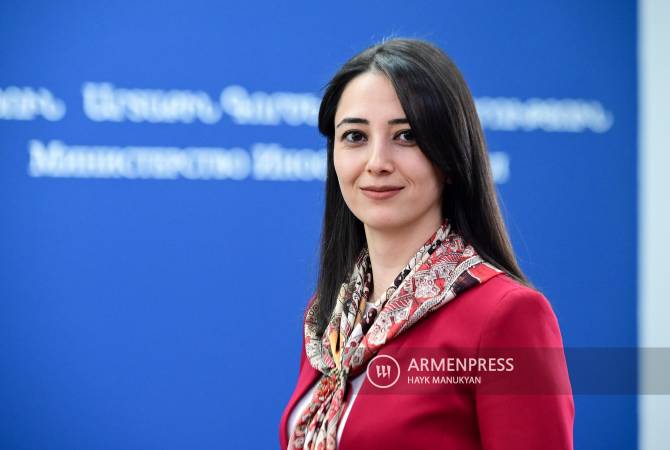Upcoming Armenia-US-EU high-level meeting not directed to any third party - Foreign Ministry
7 minute read

YEREVAN, MARCH 27, ARMENPRESS. The high-level meeting scheduled for April 5 in Brussels will be dedicated to strengthening Armenia-EU-US cooperation and is not and could not be directed against any third party, Foreign Ministry spokesperson Ani Badalyan said in response to Armenpress question.
The interview with Ani Badalyan is presented below:
- The Azerbaijani side, referring to the upcoming Armenia-EU-USA meeting, notes that it is not inclusive, and could also induce Armenia to destabilize the situation in the region.
- The high-level meeting of European Commission President Ursula von der Leyen, US Secretary of State Antony Blinken, Armenian Prime Minister Nikol Pashinyan scheduled for April 5 in Brussels will be dedicated to strengthening cooperation between Armenia, the EU, and the US. It is not and could not be directed against any third party.
As for Azerbaijan's accusations of destabilizing the situation in the region and the lack of constructivness from the Armenian side in the negotiation process, let me once again confirm that based on the principles already agreed upon with Azerbaijan, Armenia is ready to immediately sign a peace treaty, conduct border demarcation, and open regional communications. We are referring to the following three principles.
Principle 1: Armenia and Azerbaijan mutually recognize each other’s sovereignty and territorial integrity based on the 1991 Alma-Ata Declaration. This principle was agreed between Armenia and Azerbaijan on October 6, 2022 in Prague, through the mediation of French President Emmanuel Macron and EU Council President Charles Michel, then reaffirmed on May 14, 2023 and July 15, 2023 in Brussels through the mediation of EU Council President Charles Michel.
Principle 2: Armenia and Azerbaijan reaffirm their unconditional commitment to the 1991 Alma-Ata Declaration as the political basis for the border demarcation.
This principle was agreed upon by Armenia and Azerbaijan on October 6, 2022, in Prague, with the mediation of French President Emmanuel Macron and EU Council President Charles Michel. It was then reaffirmed on May 14 and July 15, 2023, in Brussels with the mediation of EU Council President Charles Michel.
This means that a new border between Armenia and Azerbaijan should not be created, but the borders that existed de jure within the framework of the USSR at the time of the adoption of the 1991 Alma-Ata Declaration should be reproduced on the ground. After redrawing the border, de jure territories belonging to each country must be under that country’s control.
Principle 3: Regional communications should be opened on the basis of the principle of sovereignty and jurisdiction of countries, within the framework of equality and reciprocity.
This principle was agreed between Armenia and Azerbaijan on July 15, 2023 in Brussels through the mediation of the President of the European Council Charles Michel. Regarding the issue, the Republic of Armenia has expressed its willingness in the "Crossroads of Peace" project, which has been widely accepted by the international community.
Unfortunately, the Azerbaijani side is delaying and undermining the peace process under various artificial pretexts, including constantly rejecting mediation proposals from the EU and the United States. Instead of complaining about inclusiveness, Azerbaijan might eventually consider accepting proposals for a meeting at the level of foreign ministers in Washington and at the level of heads of state in Brussels. It is also worth mentioning Azerbaijan's ongoing actions, such as attempts to exclude Armenia from regional projects and their efforts to undermine the principle of inclusivity. A vivid example of this is their obstruction of Armenia’s participation in the Black Sea Electric Cable project.
- The Azerbaijani side has once again expressed its displeasure regarding the EU monitoring mission in Armenia. What do you think about this?
- It is important to assess the security situation in which the EU mission was deployed. This followed a large-scale attack and occupation of the sovereign territory of the Republic of Armenia by Azerbaijan in September 2022. Even today, approximately 208 square kilometers of the sovereign territory of the Republic of Armenia are under the occupation of Azerbaijan. We highly appreciate the role of the EU monitoring mission in curbing ambitions to use force in the region and strengthening stability on the Armenia-Azerbaijan interstate border.
We also welcome the EU's decision made several months ago, regarding the increase in the number of mission members. It is also appropriate to remind that during the quadrilateral meeting held in Prague on October 6, 2022, Azerbaijan itself welcomed the proposal of the President of the European Council and the President of France to deploy an EU observation mission not only in Armenia but also in Azerbaijan. Unfortunately, Azerbaijan later abandoned that position.
- What are the expectations of the Armenian side from the upcoming high-level meeting between Armenia, the USA, and the EU on April 5?
- The meeting is a valuable opportunity to discuss the bilateral agendas between Armenia and the US, Armenia and the EU, as well as issues related to Armenia-US-EU relations. We expect substantive discussions on political dialogue, the development of Armenia’s capabilities in the economic and energy spheres, and solutions to the humanitarian problems facing Armenia. The high-level meeting is aimed at developing and deepening existing relations and is not associated with any third countries. Claims that it is directed against anyone are irrelevant, baseless, and artificial.